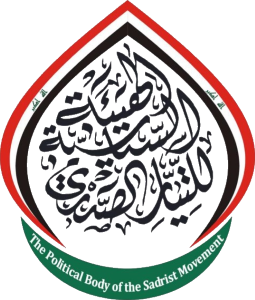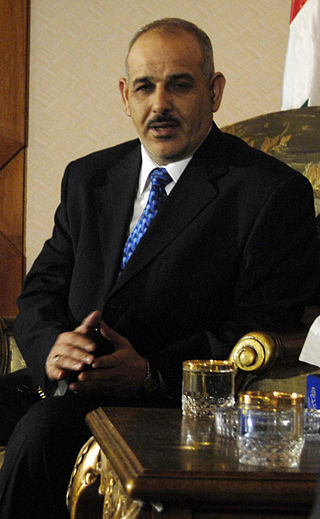Related Research Articles
Iraq is a federal parliamentary representative democratic republic. It is a multi-party system whereby the executive power is exercised by the Prime Minister of the Council of Ministers as the head of government, the President of Iraq as the head of state, and legislative power is vested in the Council of Representatives.

The Islamic Supreme Council of Iraq is a Shia Islamist political party in Iraq. It was established in Iran in 1982 by Mohammed Baqir al-Hakim and changed its name to the current Islamic Supreme Council of Iraq in 2007. Its political support comes from Iraq's Shia Muslim community.

Ibrahim Abd al-Karim al-Eshaiker, also known as Ibrahim al-Jaafari, is an Iraqi politician who was Prime Minister of Iraq in the Iraqi Transitional Government from 2005 to 2006, following the January 2005 election. He served as Minister of Foreign Affairs from 2014 to 2018.

The Islamic Dawa Party, also known as the Islamic Call Party, is a Shia Islamist political party in Iraq. Dawa and the Supreme Islamic Iraqi Council are two of the main parties in the religious-Shiite United Iraqi Alliance, which won a plurality of seats in both the provisional January 2005 Iraqi election and the longer-term December 2005 election. The party is led by Haider al-Abadi, who was the Prime Minister of Iraq from 8 September 2014 to 25 October 2018. The party backed the Iranian Revolution and also Ayatollah Ruhollah Khomeini during the Iran–Iraq War and the group still receives financial support from Tehran despite ideological differences with the Islamic Republic. As of 2019, after two decades of political prominence and success, it is suffering from internal divisions and is in danger of losing its "political relevance".

Ayatollah al-Sayyid Muhammad Baqir Muhsin al-Hakim at-Tabataba'i, also known as Shaheed al-Mehraab, was a senior Iraqi Shia Islamic Scholar and the leader of the Supreme Council for Islamic Revolution in Iraq (SCIRI). Al-Hakim spent more than 20 years in exile in Iran and returned to Iraq on 12 May 2003 following the US-led invasion. Al-Hakim was a contemporary of Ayatollah Khomeini, and The Guardian compared the two in terms of their times in exile and their support in their respective homelands. After his return to Iraq, al-Hakim's life was in danger because of his work to encourage Shiite resistance to Saddam Hussein and from a rivalry with Muqtada al-Sadr, the son of the late Ayatollah Mohammed Sadeq al-Sadr, who had himself been assassinated in Najaf in 1999. Al-Hakim was assassinated in a bomb attack in Najaf in 2003 when aged 63 years old. At least 75 others in the vicinity also died in the bombing.

Muqtada al-Sadr is an Iraqi Shia Muslim cleric, politician and militia leader. He is the leader of the Sadrist Movement and the leader of the Peace Companies, a successor to the militia he had previously led during the American military presence in Iraq, the Mahdi Army. In 2018, he joined his Sadrist political party to the Saairun alliance, which won the highest number of seats in the 2018 and 2021 Iraqi parliamentary elections.

The Mahdi Army was an Iraqi Shia militia created by Muqtada al-Sadr in June 2003 and disbanded in 2008.

The National Iraqi Alliance, also known as the Watani List, is an Iraqi electoral coalition that contested the 2010 Iraqi legislative election. The Alliance is mainly composed of Shi'a Islamist parties. The alliance was created by the Supreme Council for Islamic Revolution in Iraq to contest in the January 2005 and December 2005 under the name United Iraqi Alliance, when it included all Iraq's major Shi'a parties. The United Iraqi Alliance won both those of elections however later fell apart after several major parties left the alliance due to disputes with Prime Minister Nouri al-Maliki and the Supreme Council.

Grand Ayatollah Sayyid Muhammad-Sadiq al-Sadr was a prominent Iraqi Shia marja'. He called for government reform and the release of detained Shia leaders. The growth of his popularity, often referred to as the followers of the Vocal Hawza, also put him in competition with other Shi'a leaders, including Mohammed Baqir al-Hakim who was exiled in Iran.

The Sadrist Movement is an Iraqi Shi'a Islamic national movement and political party, led by Muqtada al-Sadr.

Jawad al-Bulani served as the Interior Minister of Iraq within the Council of Ministers under Iraqi Prime Minister Nouri al-Maliki from 8 June 2006 to 21 December 2010. Bulani is a Shi'a independent member of the United Iraqi Alliance.

Governorate or provincial elections were held in Iraq on 31 January 2009, to replace the local councils in fourteen of the eighteen governorates of Iraq that were elected in the 2005 Iraqi governorate elections. 14,431 candidates, including 3,912 women, contested 440 seats. The candidates came from over 400 parties, 75% of which were newly formed.

The State of Law Coalition, also known as Rule of Law Coalition, is an Iraqi political coalition formed for the 2009 Iraqi governorate elections by the Prime Minister of Iraq at the time, Nouri al-Maliki, of the Islamic Dawa Party.

Al-Sadr Online was the official website of the High Board for Media of Al-Sadr's Office. The High Board is the media organization of Muqtada Al-Sadr, a Shia Muslim Iraqi religious and political leader. The site, which commenced operation in 2007, performs several functions in support of Sadrist objectives. The site's distinct format includes a section in which Al-Sadr offers religious opinions in response to queries from site followers. Al-Sadr Online publishes news about Sadrist political, social, and religious activities in southern Iraq and the Arab world. In addition, the Board's staff also posts commentary on issues pertaining to Iraqi and pan-Arab politics as well as some international news. The site posts numerous links to pages of organizations sympathetic to the Sadrist Movement, many of which are based in Iran and Lebanon. Al-Sadr Online posts most of its content in Arabic, though it does maintain a less robust English page.
This article concerns the formation process of the Al Maliki I Government of Iraq in the aftermath of the Iraq National Assembly being elected on December 15, 2005. Due to disputes over alleged vote-rigging the results of the election were only certified by the Independent Electoral Commission of Iraq on February 10, 2006.
In the aftermath of the 2010 election, great attention was given to the decision on who should be the next Iraqi PM. Both al-Iraqiyya's Allawi and the State of Law coalition's al-Maliki laid claim to the post, so it was seen as up to the Kurdish parties and the Iraqi National Alliance to decide this matter.

The Al-Ahrar Bloc is an Iraqi Shia Islamist political coalition formed for the 2014 Iraqi parliamentary election. It is headed by Dia Najem Abdallah al-Asadi.

Jaysh al-Mu'ammal, also known as Liwa al-Mu'ammal or as the Popular Mobilization Forces' 99th Brigade, is a Shia Islamist Iraqi private militia that is led by Sa'ad Sawar and has fought in the Syrian Civil War and Iraqi Civil War. Founded as a splinter faction of the Sadrist Movement, Jaysh al-Mu'ammal is supported by Iran and former Iraqi Prime Minister Nouri al-Maliki.

As sequel to protests in 2011, 2012 and 2013, Iraqi citizens have also in 2015 up until 2018 often and massively protested against the corruption and incompetence in their government which according to analysts and protesters had led to long-running problems in electricity supplies, clean water availability, Iranian interference in Iraqi politics, high unemployment, and a stagnant economy.

Between the parliamentary election in October 2021 and October 2022, there was a political crisis in Iraq, with members of the Council of Representatives of Iraq being unable to form a stable coalition government, or elect a new President. Basic government services such as the civil service and military continued functioning, but the national political system was in deadlock including in respect of almost all major spending and taxation issues. On 27 October 2022, the government of Prime Minister Mohammed Shia' Al Sudani was approved by the Council of Representatives.
References
- 1 2 3 4 5 "جعفر الصدر لـ"إيلاف": لا أؤمن بأطروحة الإسلام السياسي". Elaph - إيلاف (in Arabic). 2010-06-19. Retrieved 2022-04-24.
- ↑ Augustus R. Norton (19 January 2009). Hezbollah: A Short History. Princeton University Press. p. 30. ISBN 978-0-691-14107-7 . Retrieved 9 August 2013.
- ↑ Cockburn, Patrick (21 October 2008). Muqtada Al-Sadr and the Battle for the Future of Iraq. Simon and Schuster. p. 112. ISBN 9781439141199.
- 1 2 3 4 Kaysi, Marina Ottaway, Danial. "Who Will Be the Next Prime Minister of Iraq?". Carnegie Endowment for International Peace. Retrieved 2018-05-28.
{{cite news}}: CS1 maint: multiple names: authors list (link) - 1 2 "Talisman Gate بـاب الطلــسم: Sadrist Referendum Results". talismangate.blogspot.co.uk. Retrieved 2018-05-28.
- ↑ Mamouri, Ali (2018-05-22). "Can Iraq's Sadr swing nonsectarian government?". Al-Monitor. Retrieved 2018-05-28.
- 1 2 Sly, Liz (2010-05-03). "An unlikely Iraqi leader emerges". Los Angeles Times. ISSN 0458-3035 . Retrieved 2018-05-28.
- 1 2 "MP in Iraq PM's bloc resigns over "cronyism"". Now Media. Retrieved 2018-05-28.
- ↑ "Jaafar al-Sadr : A confluence prime minister for Iraq". The Daily Star Newspaper - Lebanon. 2010-08-19. Retrieved 2018-05-28.
- ↑ Muir, Jim (2 April 2010), "How Sadrist vote could anoint new Iraq PM", BBC News , retrieved 5 May 2010
- ↑ Muir, Jim (8 April 2010), "Iraqi water still muddy after Sadr vote", BBC News , retrieved 5 May 2010
- ↑ Ahmed, Hamid (8 April 2010), "Sadr followers spurn front-runners in Iraq", boston.com , retrieved 26 May 2010
- ↑ "Jaafar Al Sadr submits resignation From House Of Representatives". Bab News (via Dinar Vets Message Board). Retrieved 2018-05-28.
- ↑ Abadi Likely to Remain Iraq’s Prime Minister: Source, Tasnim News Agency, accessed 2018-05-28
- ↑ "Ambassador Mohammad Jaafar Al-Sadr met with the Director of the international directorate at the Home office". Embassy of the Republic of Iraq in London. 2021-09-12. Archived from the original on 2021-09-12. Retrieved 2022-04-24.
{{cite web}}: CS1 maint: unfit URL (link) - ↑ "Sadr grants opponents 'opportunity' to form government without him". www.rudaw.net. Retrieved 2022-04-24.